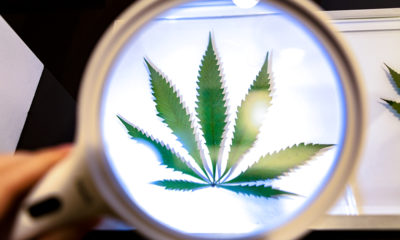
Medical
New Jersey Expands Medical Program, Adds Qualifying Conditions
New Jersey has been expecting major moves on the cannabis reform front since November when Phil Murphy moved into the governor’s mansion, and this week, the pen finally hit the paper.
On Tuesday, New Jersey Gov. Phil Murphy announced he had signed an executive order to expand the state’s medical marijuana program, including adding conditions that qualify for a medical card and allowing the purchase of edibles.
When Murphy first took office in January, he immediately ordered a full review of the state’s medical marijuana program, fulfilling the promises he made on the campaign trail last year. The review, conducted by the New Jersey Department of Health, assembled the recommendations Murphy acted on in Tuesday’s executive order.
“We need to treat our residents with compassion,” Murphy said in a statement when the review kicked off in January. “We cannot turn a deaf ear to our veterans, the families of children facing terminal illness, or to any of the other countless New Jerseyans who only wish to be treated like people, and not criminals. And, doctors deserve the ability to provide their patients with access to medical marijuana free of stigmatization.”
In today’s executive order, Murphy noted a variety of concrete reasons for moving forward with the expansion. One factor included the prospective number of patients in the state, which was calculated by looking at states with similar populations and more developed medical marijuana programs. Another factor was just how much pot the state actually has. While their neighbors in Pennsylvania can’t keep the shelves stocked, New Jersey is currently looking at a surplus of marijuana. The last point Murphy made before outlining his orders for the state regarded the potential for alleviating the devastation of the opioid crisis.
So how much has New Jersey’s medical marijuana program changed? The short answer is, a lot. First, five new qualifying conditions have been added to the medical program. Those conditions are chronic pain related to musculoskeletal disorders, chronic visceral pain, migraines, anxiety and Tourette’s Syndrome.
Will there still be enough pot with all these new patients?! Don’t worry, Murphy considered this, and made sure the executive order also includes a provision that every Alternative Treatment Center — the state’s name for dispensaries — in New Jersey will be allowed to open an additional cultivation facility to supply all their patients.
All New Jersey patients will also now have access to edible forms of marijuana, can purchase 4 ounces — instead of the previous limit of 2 ounces — of flower a month, and will only have to pay $100 for a state marijuana card instead of $200.
On the ground in New Jersey, the activists that lived under the administration of previous governor Chris Christie say that they’re pinching themselves now that this day is finally a reality.
“It’s great to see a government here in New Jersey that understands the need for reforming our marijuana laws and medical marijuana program. This will help patients that need it most in the short term as the legislature continues to sort through and craft the adult-use legalization law,” New Jersey NORML Executive Director Evan Nison told Cannabis Now.
NORML’s national leadership concurred with their state affiliate.
“Governor Murphy’s expansion of his state’s medical marijuana program will immediately bring relief to thousands of patients across New Jersey who were locked out of the abysmal, designed-to-fail current system,” NORML Executive Director Erik Altieri told Cannabis Now.
Alteri went on to note that expanding the conditions list, abandoning a required doctor registry and reducing medical costs are all common sense reforms that were long overdue and “were never seriously entertained while the state suffered under the leadership of reefer-mad Chris Christie.”
“We hope that Governor Murphy will bring this same kind of sensible policy direction to the ongoing and important talks occurring currently in regards to legalization in the Garden State. The fact that he addressed the medical marijuana issue head-on in his first several months in office bodes well for how seriously he will take the fight for recreational marijuana moving forward,” said Altieri.
TELL US, does your state have enough qualifying conditions for medical marijuana?
























